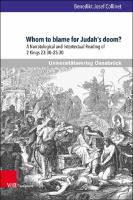Whom to blame for Judah’s doom?
A narratological and intertextual Analysis of 2 Kgs 23:30–25:30
| dc.contributor.author | Collinet, Benedikt J. | |
| dc.date.accessioned | 2023-01-25T04:00:45Z | |
| dc.date.available | 2023-01-25T04:00:45Z | |
| dc.date.issued | 2023 | |
| dc.identifier.isbn | 9783847113447 | |
| dc.identifier.uri | https://library.oapen.org/handle/20.500.12657/60873 | |
| dc.description.abstract | The Babylonian exile is considered one of the worst trauma experiences in the context of HB/OT, with which a multitude of biblical texts are concerned. The final chapters of 2 Kings offer various theological interpretations of how and why the exile had to occur. Narratively, the study approaches the pericope and seeks to identify these interpretive models. | |
| dc.language | English | |
| dc.subject.other | 2 Kings; Narratology; Babylonian Exile; trauma, guilt, hope | en |
| dc.subject.other | Ã FOS 2012 -- HUMANITIES (6) -- Philosophy, Ethics, Religion (603) -- Theology (6032) -- Old Testament studies (603201) | en |
| dc.subject.other | 2 Könige; Narratologie; Babylonisches Exil, Trauma, Schuld; Hoffnung | de |
| dc.subject.other | Ã FOS 2012 -- GEISTESWISSENSCHAFTEN (6) -- Philosophie, Ethik, Religion (603) -- Theologie (6032) -- Alttestamentliche Bibelwissenschaft (603201) | de |
| dc.title | Whom to blame for Judah’s doom? | de |
| dc.title.alternative | A narratological and intertextual Analysis of 2 Kgs 23:30–25:30 | |
| dc.type | book | |
| dc.type | book | |
| oapen.abstract.otherlanguage | Das babylonische Exil gilt als eine der schlimmsten Traumaerfahrungen im Kontext von HB/AT, mit der eine Vielzahl von biblischen Texten befasst ist. Der Schluss von 2 Könige bietet verschiedene theologische Deutungen an, wie und warum es zum Exil kommen musste. Erzähltechnisch nähert sich die Studie der Erzählung an und sucht diese Deutungsmodelle zu identifizieren. | |
| oapen.relation.isPublishedBy | af16fd4b-42a1-46ed-82e8-c5e880252026 | * |
| oapen.relation.isFundedBy | 0bdd30b8-28cc-4e2d-bd69-6cabb77b36d4 | |
| oapen.collection | Austrian Science Fund (FWF) | |
| oapen.imprint | V&R unipress | |
| oapen.grant.number | PUB 670 |

